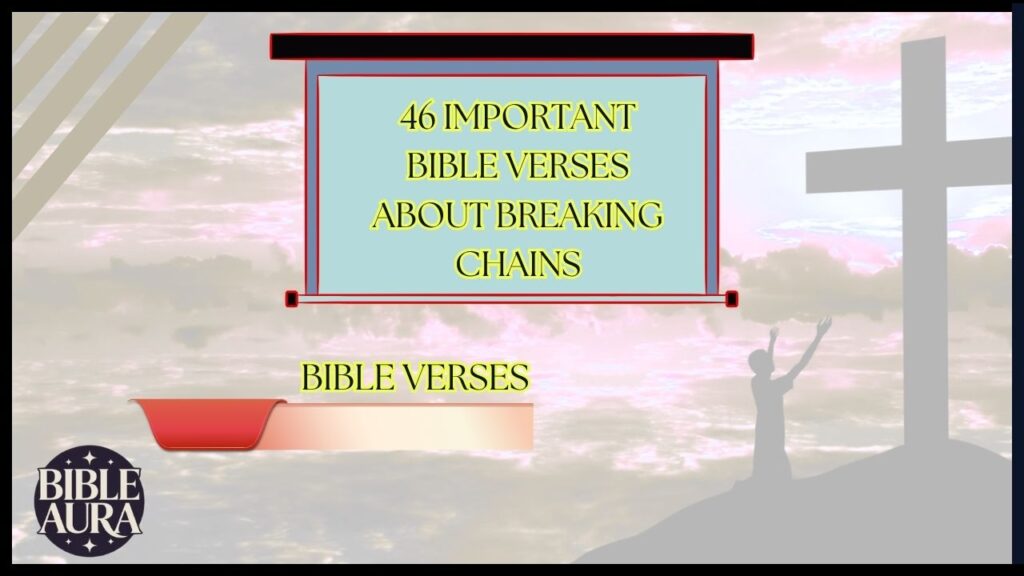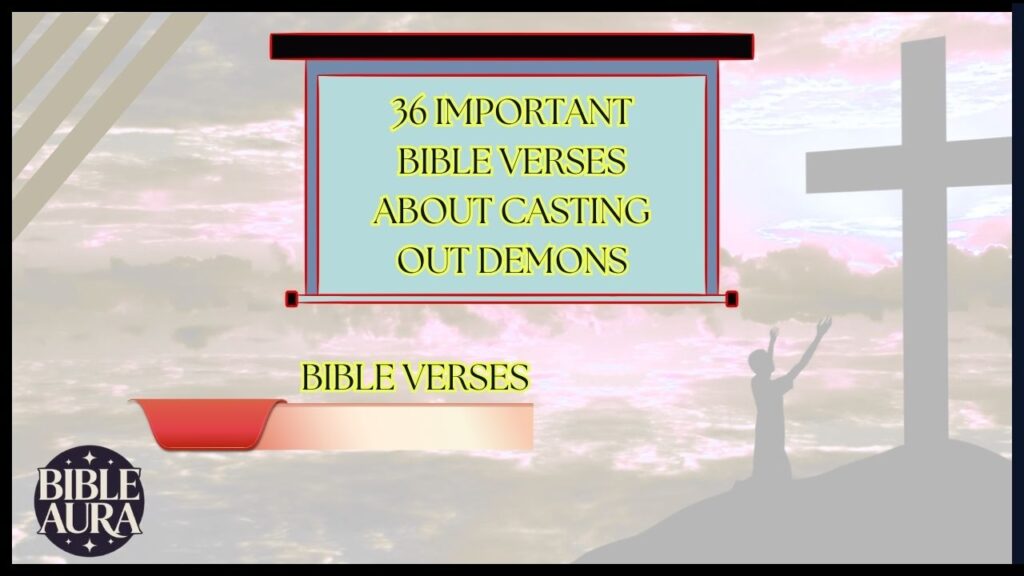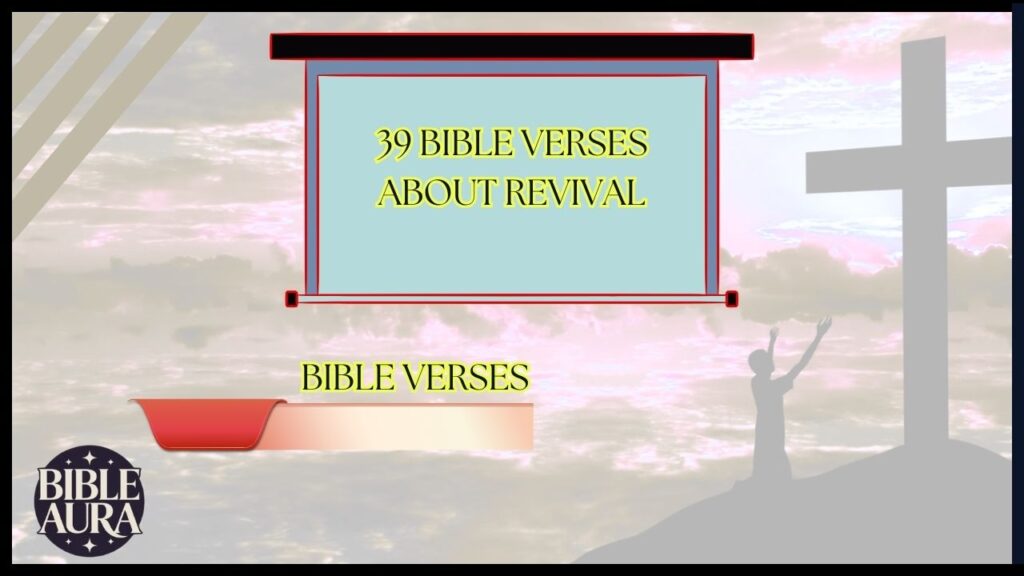Bible Verses About Breaking Chains: In our walk with Christ, we all experience times when we feel bound by circumstances, habits, sins, or emotional burdens. These spiritual and metaphorical chains can leave us feeling trapped and helpless.
But God’s Word offers us powerful promises of freedom. Scripture reminds us that Christ came to set the captives free and break every chain that binds us.
The Bible is filled with verses about breaking chains both literal and figurative showing God’s desire to liberate His people from all forms of bondage. These passages offer hope, encouragement, and practical wisdom for those seeking freedom in Christ.
Also Read: 47 Bible Verses About Being Set Apart (Explained)
Freedom from Sin and Death
1. John 8:36
“So if the Son sets you free, you will be free indeed.”
Jesus offers the ultimate freedom liberation from sin’s power. This verse reminds us that Christ’s freedom isn’t partial or temporary but complete and eternal. When you struggle with recurring sins or habits, remember that Jesus’ work on the cross has already secured your freedom.
2. Romans 6:6
“For we know that our old self was crucified with him so that the body ruled by sin might be done away with, that we should no longer be slaves to sin.”
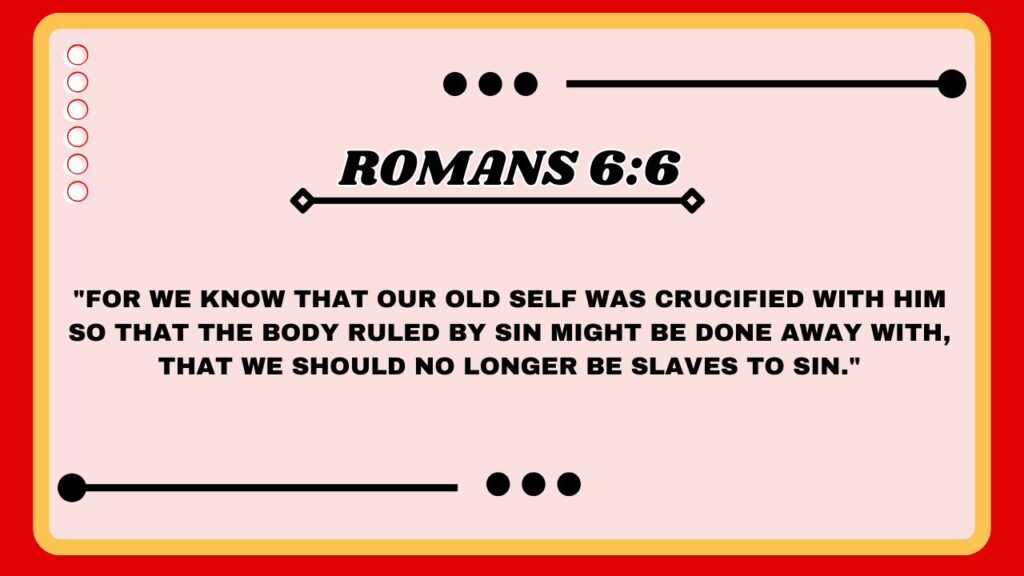
Paul explains that our sinful nature was crucified with Christ, breaking sin’s power over us. This verse teaches us that we’re no longer slaves to sin but have been given a new nature. Remind yourself of this spiritual reality when temptation comes, declaring your freedom from sin’s dominion.
3. Romans 8:2
“For the law of the Spirit of life in Christ Jesus has set you free from the law of sin and of death.”
This verse contrasts two spiritual laws: one leading to death, the other to life. Through Christ, we’ve been released from sin’s inevitable consequences. Apply this truth by walking according to the Spirit rather than the flesh, trusting in God’s life-giving power daily.
4. Galatians 5:1
“It is for freedom that Christ has set us free. Stand firm, then, and do not let yourselves be burdened again by a yoke of slavery.”
Paul reminds believers that freedom is Christ’s intention for us, not a side benefit. The command to “stand firm” suggests our freedom requires vigilance and determination. Practice standing firm by identifying areas where you’re tempted to return to old patterns and actively resist them.
5. 2 Corinthians 3:17
“Now the Lord is the Spirit, and where the Spirit of the Lord is, there is freedom.”
This verse connects God’s presence with true freedom. Where God’s Spirit dwells, chains cannot remain. Cultivate awareness of the Holy Spirit’s presence in your daily life, inviting Him into situations where you feel bound or restricted.
Also Read: 42 Powerful Bible Verses For Baby Dedication
Breaking Chains of Fear and Anxiety
6. Isaiah 41:10
“Fear not, for I am with you; be not dismayed, for I am your God; I will strengthen you, I will help you, I will uphold you with my righteous right hand.”
God commands us not to fear while promising His presence, strength, and support. This verse breaks the chains of fear by reminding us of God’s constant presence. When anxiety strikes, verbalize this promise, acknowledging God’s presence with you in that moment.
7. Psalm 34:4
“I sought the LORD, and he answered me and delivered me from all my fears.”
David testifies to God’s faithfulness in delivering him from fear. Notice that deliverance came through seeking God, not through self-help techniques. Make seeking God your first response to fear, trusting His ability to break fear’s hold on your mind.
8. 2 Timothy 1:7
“For God has not given us a spirit of fear, but of power and of love and of a sound mind.”
Paul clarifies that fear doesn’t come from God; instead, He gives power, love, and self-discipline. This verse helps identify the source of our fears and replaces them with godly alternatives. When fear arises, recognize it as foreign to your new nature and embrace the power, love, and clarity of thought God provides.
9. Philippians 4:6-7
“Do not be anxious about anything, but in every situation, by prayer and petition, with thanksgiving, present your requests to God. And the peace of God, which transcends all understanding, will guard your hearts and your minds in Christ Jesus.”
Paul provides a practical method for breaking anxiety’s chains: prayer with thanksgiving. The result is supernatural peace that protects our thoughts and emotions. Practice this verse by turning anxious thoughts into specific prayers, always including elements of gratitude.
10. 1 Peter 5:7
“Cast all your anxiety on him because he cares for you.”
Peter uses imagery of throwing or tossing our anxieties onto God. This requires a deliberate action of release, motivated by confidence in God’s care. Visualize physically casting your worries onto God each time they arise, trusting in His loving concern for you.
Also Read: 38 Bible Verses About Welcoming Visitors (Explained)
Liberation from Oppression and Injustice
11. Isaiah 58:6
“Is not this the fast that I choose: to loose the bonds of wickedness, to undo the straps of the yoke, to let the oppressed go free, and to break every yoke?”

God redefines true spiritual discipline as breaking chains of oppression and injustice. This verse connects our spiritual practices with practical actions of liberation for others. Examine your life for ways you can participate in God’s work of setting others free from various forms of bondage.
12. Psalm 146:7
“Who executes justice for the oppressed, who gives food to the hungry. The LORD sets the prisoners free.”
This psalm celebrates God’s character as a liberator who acts on behalf of the marginalized. It reminds us that freedom for the oppressed is central to God’s nature. Partner with God by advocating for those experiencing injustice and supporting ministries that provide practical help.
13. Isaiah 61:1
“The Spirit of the Sovereign LORD is on me, because the LORD has anointed me to proclaim good news to the poor. He has sent me to bind up the brokenhearted, to proclaim freedom for the captives and release from darkness for the prisoners.”
This prophecy, which Jesus claimed for Himself, outlines God’s liberation agenda good news, healing, freedom, and light. These are the hallmarks of Christ’s ministry. Align your priorities with Christ’s by participating in ministries that offer spiritual and practical freedom to others.
14. Acts 12:7
“Suddenly an angel of the Lord appeared and a light shone in the cell. He struck Peter on the side and woke him up. ‘Quick, get up!’ he said, and the chains fell off Peter’s wrists.”
This account of Peter’s supernatural prison break demonstrates God’s power to break physical chains. While miraculous, it illustrates God’s desire and ability to liberate His people. Remember that the God who broke Peter’s chains still works today, making even impossible situations possible.
15. Psalm 107:14
“He brought them out of darkness, the utter darkness, and broke away their chains.”
This psalm describes God’s deliverance of those who cried out to Him from desperate situations. It emphasizes both spiritual darkness and physical bondage being overcome. Make crying out to God your first response in seemingly hopeless situations, trusting His power to break chains.
Breaking Chains of Condemnation and Shame
16. Romans 8:1
“Therefore, there is now no condemnation for those who are in Christ Jesus.”
Paul declares the complete absence of condemnation for those in Christ. This verse breaks the chains of guilt that many Christians carry unnecessarily. When feelings of condemnation arise, actively reject them as inconsistent with your standing in Christ.
17. 2 Corinthians 5:17
“Therefore, if anyone is in Christ, the new creation has come: The old has gone, the new is here!”
This verse emphasizes the complete transformation that occurs in Christ. Past failures no longer define you; your new identity does. Combat shame by regularly affirming your identity as a new creation, refusing to be defined by past mistakes.
18. Psalm 34:5
“Those who look to him are radiant; their faces are never covered with shame.”
David connects looking to God with freedom from shame. The radiance described suggests a visible transformation. Develop a habit of “looking to God” through worship and meditation on His character when shame threatens to overwhelm you.
19. Isaiah 54:4
“Do not be afraid; you will not be put to shame. Do not fear disgrace; you will not be humiliated. You will forget the shame of your youth and remember no more the reproach of your widowhood.”
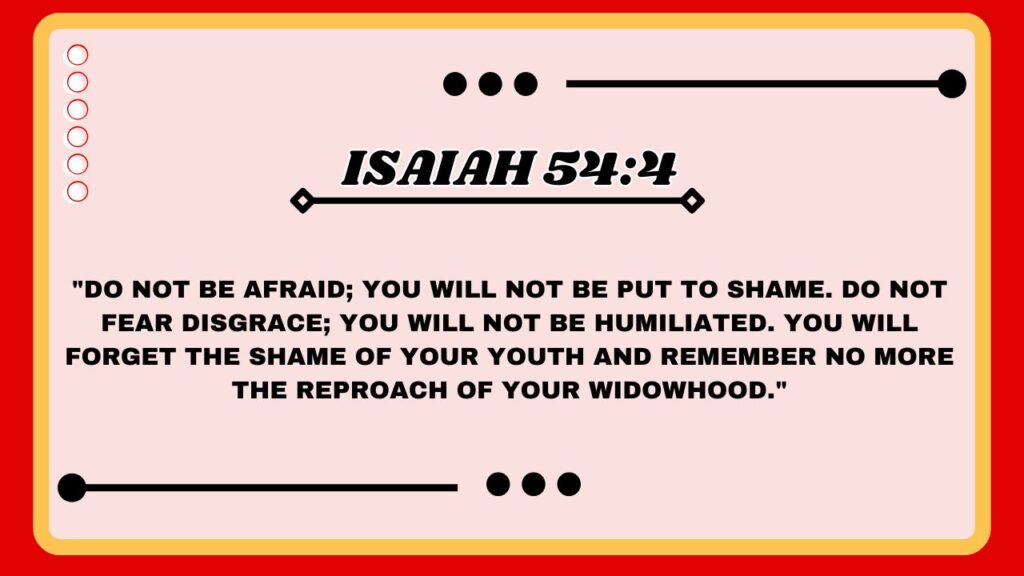
God promises complete freedom from shame and the ability to forget past humiliations. This verse breaks shame’s power to define our future. Practice “holy forgetting” by refusing to rehearse past failures and focusing instead on God’s redemptive work in your life.
20. 1 John 1:9
“If we confess our sins, he is faithful and just and will forgive us our sins and purify us from all unrighteousness.”
John provides a simple but powerful process for dealing with sin: confession leads to forgiveness and cleansing. This breaks the cycle of hidden sin and lingering guilt. Make confession a regular spiritual practice, experiencing the freedom that comes with bringing sin into the light.
Also Read: 39 Bible Verses About Revival
Freedom from Addiction and Destructive Habits
21. 1 Corinthians 6:12
“‘I have the right to do anything,’ you say but not everything is beneficial. ‘I have the right to do anything’ but I will not be mastered by anything.”
Paul addresses the balance between Christian freedom and enslavement to habits. This verse establishes a principle for evaluating activities: does this master me? Apply this test to habits in your life, honestly assessing whether they control you rather than you controlling them.
22. Romans 6:14
“For sin shall no longer be your master, because you are not under the law, but under grace.”
Paul declares that sin’s mastery is broken through grace, not through stricter rule-keeping. This verse provides hope for those struggling with addictive behaviors. Receive God’s grace daily, understanding that freedom comes through relationship with God, not perfect performance.
23. James 4:7
“Submit yourselves, then, to God. Resist the devil, and he will flee from you.”
James offers a two-step process for spiritual victory: submission to God followed by resistance to evil. This order is crucial for breaking addiction’s chains. Practice this sequence by first yielding to God’s authority before attempting to resist temptation in your own strength.
24. Titus 2:11-12
“For the grace of God has appeared that offers salvation to all people. It teaches us to say ‘No’ to ungodliness and worldly passions, and to live self-controlled, upright and godly lives in this present age.”
Paul explains that grace not only saves us but teaches us self-control. This verse challenges the misconception that grace leads to license. Allow God’s grace to train you in saying “no” to unhealthy desires, recognizing this as a learning process that takes time.
25. Galatians 5:16
“So I say, walk by the Spirit, and you will not gratify the desires of the flesh.”
Paul provides a proactive strategy for overcoming destructive desires: walking by the Spirit. This verse suggests that positive spiritual engagement displaces negative behaviors. Focus on developing spiritual disciplines that strengthen your walk with the Spirit rather than merely fighting against temptation.
Breaking Chains of Unforgiveness and Bitterness
26. Matthew 6:14-15
“For if you forgive other people when they sin against you, your heavenly Father will also forgive you. But if you do not forgive others their sins, your Father will not forgive your sins.”
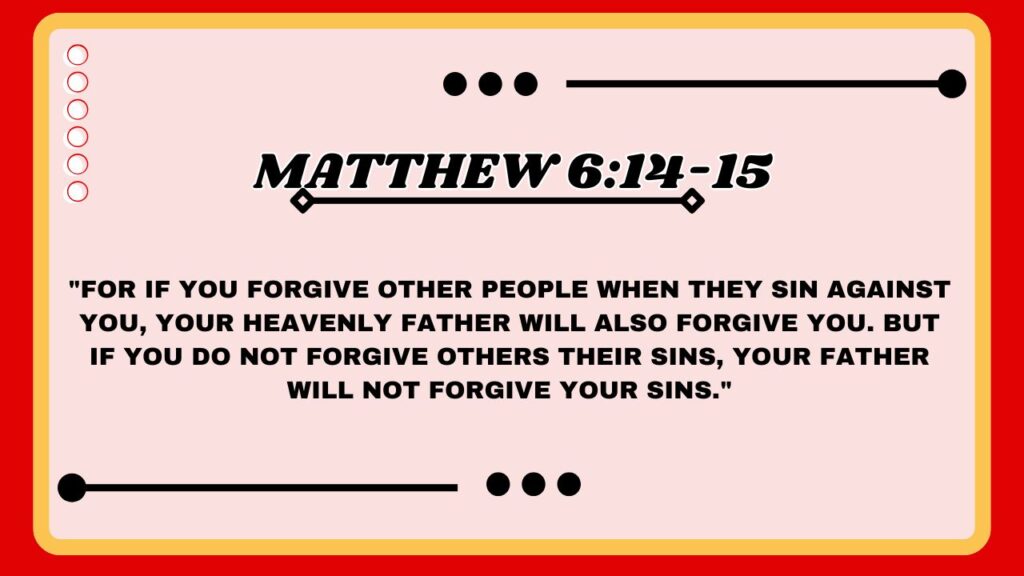
Jesus establishes a direct connection between receiving and extending forgiveness. Unforgiveness chains both the offender and the offended. Practice forgiveness as an act of obedience and self-liberation, even when feelings haven’t caught up with your decision.
27. Ephesians 4:31-32
“Get rid of all bitterness, rage and anger, brawling and slander, along with every form of malice. Be kind and compassionate to one another, forgiving each other, just as in Christ God forgave you.”
Paul contrasts attitudes that create bondage with those that foster freedom. The command to “get rid of” suggests active removal of negative emotions. Replace bitter thoughts with intentional acts of kindness toward those who have hurt you, following Christ’s example of forgiveness.
28. Hebrews 12:15
“See to it that no one falls short of the grace of God and that no bitter root grows up to cause trouble and defile many.”
The writer portrays bitterness as a root that grows and spreads, affecting many beyond the original hurt. This verse highlights the community impact of personal unforgiveness. Examine your heart regularly for “bitter roots,” addressing hurts before they develop into entrenched bitterness.
29. Colossians 3:13
“Bear with each other and forgive one another if any of you has a grievance against someone. Forgive as the Lord forgave you.”
Paul connects our horizontal forgiveness with the vertical forgiveness we’ve received from Christ. The standard for our forgiveness is Christ’s forgiveness of us. Reflect on the extent of God’s forgiveness toward you when struggling to forgive others, drawing strength from His example.
30. Mark 11:25
“And when you stand praying, if you hold anything against anyone, forgive them, so that your Father in heaven may forgive you your sins.”
Jesus teaches that unforgiveness hinders our prayer life. This verse suggests examining our relationships before approaching God in prayer. Make forgiveness checks part of your prayer routine, addressing relational barriers before presenting requests to God.
Also Read: 36 Important Bible Verses About Casting Out Demons
Freedom from Past Trauma and Wounds
31. Psalm 147:3
“He heals the brokenhearted and binds up their wounds.”
This psalm portrays God as a physician who specializes in emotional healing. God not only sees our inner pain but actively treats it. Bring your emotional wounds honestly before God, allowing Him access to areas you may have hidden even from yourself.
32. Isaiah 43:18-19
“Forget the former things; do not dwell on the past. See, I am doing a new thing! Now it springs up; do you not perceive it? I am making a way in the wilderness and streams in the wasteland.”
God encourages looking forward rather than remaining fixated on past events. This verse breaks the chains of a pain-defined identity. Practice intentional focus on God’s current and future work in your life rather than continually revisiting past traumas.
33. Isaiah 61:3
“To provide for those who grieve in Zion to bestow on them a crown of beauty instead of ashes, the oil of joy instead of mourning, and a garment of praise instead of a spirit of despair.”
God promises to transform our pain into something beautiful and purposeful. This verse describes God’s restorative exchanges in our lives. Look for ways God is bringing beauty from your painful experiences, perhaps through your ability to comfort others with similar wounds.
34. Psalm 30:11
“You turned my wailing into dancing; you removed my sackcloth and clothed me with joy.”
David testifies to God’s ability to completely transform emotional states. This verse showcases the extent of healing God offers not just reduction of pain but its replacement with joy. Expect complete transformation, not merely coping mechanisms, as you submit your past to God’s healing.
35. Revelation 21:4
“He will wipe every tear from their eyes. There will be no more death or mourning or crying or pain, for the old order of things has passed away.”
This promise of ultimate healing reminds us that some pain may remain until Christ’s return. Yet this verse offers hope that all suffering is temporary in light of eternity. Balance realistic expectations for healing in this life with confident hope in complete restoration in the life to come.
Also Read: 45 Bible Verses About Gossip and Slander (Explained)
Breaking Generational Chains
36. Ezekiel 18:20
“The soul who sins shall die. The son shall not suffer for the iniquity of the father, nor the father suffer for the iniquity of the son. The righteousness of the righteous shall be upon himself, and the wickedness of the wicked shall be upon himself.”
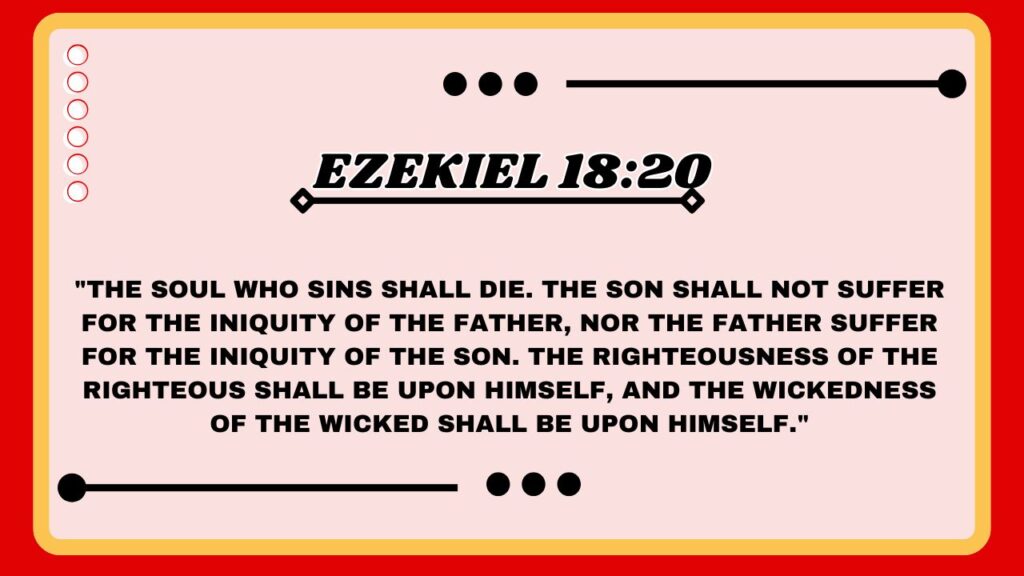
God establishes individual responsibility for sin, challenging the concept of inevitable generational curses. This verse breaks the fatalism that can accompany awareness of family patterns. Take personal responsibility for your choices regardless of family history, trusting God’s power to help you establish new patterns.
37. Exodus 20:5-6
“You shall not bow down to them or serve them, for I the LORD your God am a jealous God, visiting the iniquity of the fathers on the children to the third and the fourth generation of those who hate me, but showing steadfast love to thousands of generations of those who love me and keep my commandments.”
While acknowledging generational consequences of sin, God emphasizes His greater desire to extend blessing through generations. This verse reveals God’s heart to break negative cycles. Position yourself and your family in the stream of God’s blessing by cultivating love for God and obedience to His commands.
38. John 8:32
“Then you will know the truth, and the truth will set you free.”
Jesus connects freedom with knowing truth. Family systems often perpetuate themselves through lies and denial. Pursue truth about your family patterns with courage, knowing that honest assessment is the first step toward breaking destructive cycles.
39. 2 Corinthians 10:4-5
“The weapons we fight with are not the weapons of the world. On the contrary, they have divine power to demolish strongholds. We demolish arguments and every pretension that sets itself up against the knowledge of God, and we take captive every thought to make it obedient to Christ.”
Paul describes spiritual warfare against entrenched patterns of thinking. Generational issues often manifest as mental strongholds. Identify thought patterns you’ve inherited that contradict God’s truth, actively replacing them with biblical thinking through scripture meditation.
40. Joshua 24:15
“But if serving the LORD seems undesirable to you, then choose for yourselves this day whom you will serve, whether the gods your ancestors served beyond the Euphrates, or the gods of the Amorites, in whose land you are living. But as for me and my household, we will serve the LORD.”
Joshua’s declaration demonstrates the power of a deliberate choice to break with previous generations’ spiritual practices. This verse emphasizes our ability to choose differently. Make conscious decisions about which family traditions, values, and practices you will continue and which you will replace with godly alternatives.
Freedom Through Christ’s Power
41. Luke 4:18-19
“The Spirit of the Lord is on me, because he has anointed me to proclaim good news to the poor. He has sent me to proclaim freedom for the prisoners and recovery of sight for the blind, to set the oppressed free, to proclaim the year of the Lord’s favor.”
Jesus announces His mission as one of comprehensive liberation. This verse reveals that freedom is central to Christ’s purpose. Align yourself with Christ’s mission by both receiving and extending His freedom to others.
42. Zechariah 9:11-12
“As for you, because of the blood of my covenant with you, I will free your prisoners from the waterless pit. Return to your fortress, you prisoners of hope; even now I announce that I will restore twice as much to you.”
God promises liberation based on covenant relationship, not human merit. This verse introduces the concept of “prisoners of hope” those who anticipate freedom. Cultivate hope even in your imprisonment, knowing that God’s covenant guarantees your eventual freedom.
43. Acts 16:25-26
“About midnight Paul and Silas were praying and singing hymns to God, and the other prisoners were listening to them. Suddenly there was such a violent earthquake that the foundations of the prison were shaken. At once all the prison doors flew open, and everyone’s chains came loose.”
This account shows how praise precedes liberation. Paul and Silas worshiped before their chains fell off. Make praise a practice even in your captivity, trusting God’s power to break chains in His timing and way.
44. Isaiah 10:27
“In that day their burden will be lifted from your shoulders, their yoke from your neck; the yoke will be broken because you have grown so fat.” (NIV 1984)
This prophetic verse attributes freedom to anointing (often translated as “fatness”). It suggests spiritual vitality breaks chains of oppression. Prioritize spiritual nourishment through God’s Word and presence, allowing your spiritual strength to grow until chains can no longer hold you.
45. Psalm 118:5
“Out of my distress I called on the LORD; the LORD answered me and set me free.”
The psalmist connects crying out to God with experiencing freedom. This simple verse establishes a pattern: distress, prayer, divine response, liberation. Make calling on God your first response to bondage rather than a last resort when other methods fail.
46. Isaiah 52:2-3
“Shake off your dust; rise up, sit enthroned, Jerusalem. Free yourself from the chains on your neck, Daughter Zion, now a captive. For this is what the LORD says: ‘You were sold for nothing, and without money you will be redeemed.'”
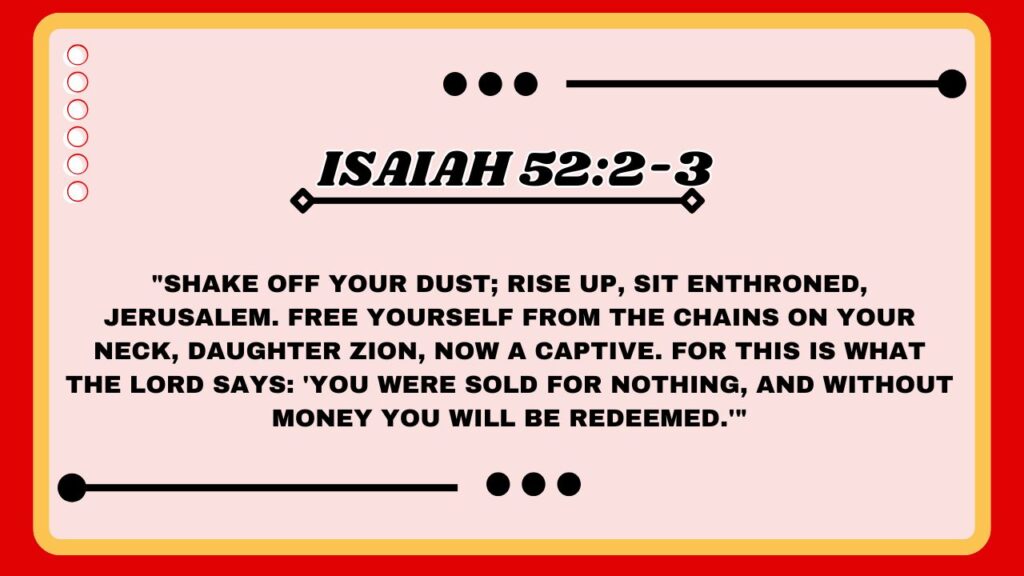
God calls His people to participate in their liberation by rising up and shaking off their bonds. This verse balances divine and human responsibility in breaking chains. Take active steps toward freedom while trusting God’s redemptive power, refusing to remain passive in your captivity.
Conclusion: Bible Verses About Breaking Chains
The Bible’s message about breaking chains is clear: God desires our complete freedom, and through Christ, He has provided everything needed to break every form of bondage. These verses remind us that freedom isn’t just a distant hope but our present inheritance in Christ.
True liberation comes through understanding our identity in Christ, embracing the power of the Holy Spirit, and applying God’s truth to our specific situations. Whether you’re struggling with sin, fear, unforgiveness, addiction, or generational patterns, God’s Word provides the keys to your freedom.
Remember that breaking chains is both an event and a process. Some bonds break instantly upon encountering God’s truth, while others require persistent application of spiritual principles. But in all cases, freedom is God’s intention for His children.
As you apply these verses to your life, may you experience the truth of Jesus’ words: “If the Son sets you free, you will be free indeed” (John 8:36).
Practical Ways to Use These Verses
- Create scripture cards for the specific chains you’re battling. Keep them visible where you’ll see them daily.
- Begin a “Freedom Journal” where you record your journey of breaking free, using these verses as guideposts.
- Form a prayer partnership with someone fighting similar battles, praying these verses over each other regularly.
- Memorize key verses that speak directly to your situation, reciting them when temptation or bondage threatens.
- Create personalized declarations based on these verses: “Because of Christ, I am free from _______.”
- Start a small group study focused on breaking specific chains, using these verses as discussion starters.
- Share your testimony of chain-breaking with others still in bondage, incorporating these verses into your story.
- Post verses on social media to encourage others seeking freedom from similar struggles.
- Create art or music inspired by these freedom verses as a creative expression of your journey.
- Pray these verses over family members struggling with generational patterns or addictions.
Frequently Asked Questions
Can Christians still be in bondage?
Yes, while Christians are positionally free in Christ, we may still experience practical bondage to sin patterns, harmful thoughts, or emotional wounds. The verses in this article help believers apply Christ’s finished work to specific areas of struggle.
How long does it take to break spiritual chains?
The timeline varies based on the nature of the bondage, its duration, and our cooperation with God’s process. Some chains break instantly upon encountering truth, while others require persistent application of spiritual principles over time.
What if I keep falling back into old patterns?
Recurring struggles don’t mean freedom is impossible. They often indicate deeper issues requiring attention or the need for additional support. Persist in applying God’s truth, consider Christian counseling, and engage with supportive community.
Are generational curses biblical?
While the Bible acknowledges that sin patterns can affect multiple generations, Christ’s redemptive work can break these patterns. Focus on Ezekiel 18:20 and your identity in Christ rather than fearing inevitable curses.
What’s the relationship between deliverance and discipleship?
Deliverance (the breaking of chains) and discipleship (growing in Christ-likeness) work together. Immediate deliverance often needs to be sustained through ongoing discipleship practices that renew the mind and strengthen spiritual muscles.
How can I help someone else break free from chains?
Pray for them using these verses, share truth in love without condemnation, be patient with their process, and connect them with appropriate resources and community. Remember that ultimately, freedom comes through their personal encounter with Christ.
Read more knowledgeable blogs on Bible Aura

Piper McMillan is a passionate writer and educator dedicated to sharing the beauty and depth of the Bible. As the author behind the Piper McMillan website, she explores Bible verses, unlocks biblical narratives, and provides insights for living a Christ-centered life. Through warm, approachable, and inspiring articles, Piper guides readers to deepen their understanding of Scripture and apply its timeless wisdom to daily living. Her mission is to uplift, educate, and help others walk faithfully with God, rooted in His word.

